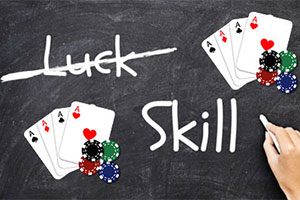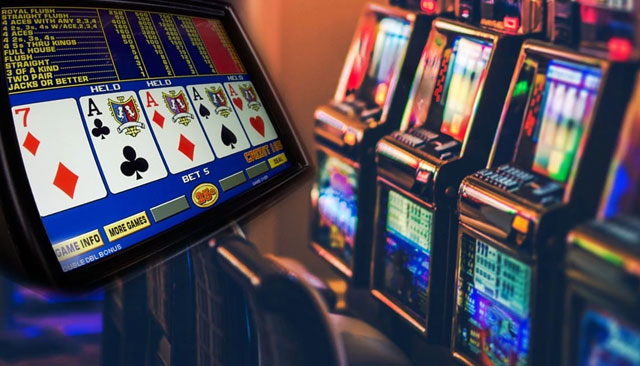A Visionary Inventor
Si Redd is one of the most influential figures in the history of gambling. Back in the days when the most complex machines out on the casino floors were ‘one armed bandits’ with wheels and gears that you could see spinning through the windows, gamblers just didn’t trust the odds on a machine with no moving parts. Too easy for the house to rig the odds, they thought. Slots might have stayed the same forever, if it weren’t for William ‘Si’ Redd.
Known as the ‘Father of Video Poker’ Si is also responsible for progressive slots being the casino staple that we know and love today – ‘MegaBucks’ was his game and all of those amazing jackpot winners have Si Redd to thank. Video Poker, especially now it’s become so popular online, might be his biggest legacy though.
Tough Beginnings
The first poker machines were way earlier than Si Redd – the game has always been popular. But the versions that never quite caught on, such as the ‘Skill Draw’ game invented by Charles Fey in 1901, included 50 cards on 5 reels. Typically they would remove the 10 of Spades and the Jack of Hearts, which in effect halved the chances of getting a Royal Flush (not to mention a load of other great hands). Imagine playing online video poker these days with those odds! No Thanks!
A game of skill, and luck
These shenanigans might be why the beginnings of video poker were so rocky. It can’t have helped the game’s reputation amongst seasoned poker players. Indeed, the first Video Poker machine, the Dale Electronics Corp.’s Poker-Matic, didn’t become popular at all across Vegas. Now Video poker is the #2 game in all casinos after slots!

But once the video poker machines became well established by Sircoma (Si Redd’s Coin Machines) in the late 1970s/early 1980s, people never looked back. He even pitched the idea to his bosses at the time, executives at Bally Gaming, a slot machine producer. They decided that they didn’t want to move away from the classic slot machines that were their bread and butter, but allowed Redd to keep the patent! When it comes to poker, you’ve got to have skill, but it doesn’t hurt to have luck on your side either, hey?
Jacks or Better, meaning a payout on any hand where you manage to get more than a pair of Jacks, began a few years later, and really took off. It is still the most popular variation of Video poker played today, either as online video poker or on the physical machines.
A modern classic
Video poker, especially online video poker, is one of the casino games that has benefited the most from changing technology in recent years. Since the first Sircoma systems hit casino floors in 1979, video poker has spread across the world, leaving the casino behind. In the right places, if you know where to look, you can find video poker in bus stations, cafes, strip clubs, airports and bars. As well as that, of course, you can play it anywhere you like via your smartphone or tablet, as online video poker.
Online video poker really began in 1994, with Microgaming’s first version. More and more features were added as demand and the technological capability grew. One of the reasons for video poker’s success was the adaptability of the game, players really feel like they have a wide variety of betting options, and it’s even better as online video poker, because there’s really no limits to what’s possible on the internet!
Where players in the 80s loved Si Redd’s machines because they only needed 1 coin to play a casual game of poker, players now love online video poker as an option for the amazing no-stakes bets and bonuses offered by online casinos.
Sometimes players are intimidated by poker tables, either off- or online, it’s never clear who you’re playing against. It’s also usually not a game you can just sit down and get a couple of hands in – if you’re playing against real opponents, you’re supposed to read the table, look for tells and that kind of work means a few hours and a lot of cash investment. Online video poker doesn’t require anything like that, you can play for the stakes you want, in the time you have. All while enjoying a theoretical Return to Player ratio (RTP) of 99.5%, (if you play your cards right!)


 Peters Casino
Peters Casino  1xslots Casino
1xslots Casino  Chomp Casino
Chomp Casino  Enzo Casino
Enzo Casino  TS Casino
TS Casino  mBit Casino
mBit Casino  Spinia Casino
Spinia Casino  Spins Royale Casino
Spins Royale Casino  WinsPark Casino
WinsPark Casino  Viva Fortunes Casino
Viva Fortunes Casino  Secrets of Atlantis Slot
Secrets of Atlantis Slot  Bust the Bank
Bust the Bank  So Many Monsters Slot
So Many Monsters Slot  Starburst Slot
Starburst Slot  Red Hot Devil Slot
Red Hot Devil Slot  Basketball Star Slot
Basketball Star Slot  Hound Hotel Slot
Hound Hotel Slot  Skazka Slot
Skazka Slot  Break Away Deluxe Slot
Break Away Deluxe Slot  Halloween Slot
Halloween Slot 